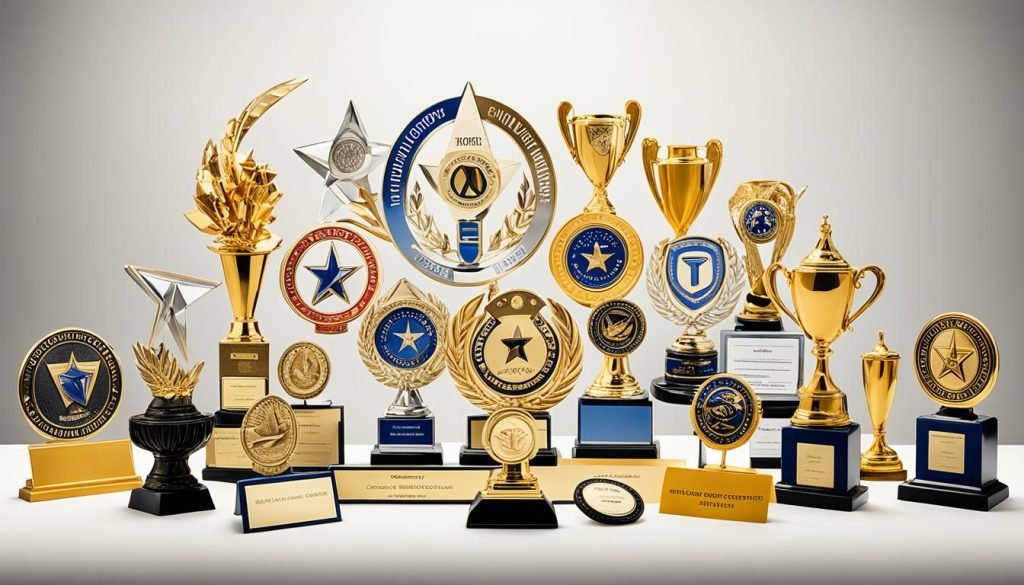Recognition and rewards are key to boosting motivation and morale at work. They acknowledge peoples’ progress and accomplishments. This builds a culture where everyone feels their efforts are valued.
What’s the big deal about knowing the difference between recognition and rewards? Well, it helps make sure we use them right. This maximizes their positive impact. Because recognition is more about praising the effort and growth an employee shows. It boosts their confidence and makes them feel valued. This leads to more people finding happiness in their jobs and wanting to learn and grow more.
On the flip side, rewards happen when someone goes above and beyond. They’re for things like winning an award or reaching a big goal. Rewarding these moments encourages everyone to aim high. It also makes the whole team, and the company, look good.
Hitting the right note with recognition and rewards does wonders. It brings teams closer, makes employees happier, and boosts how much they get done. Plus, celebrating successes not only cheers on hard work but also lights the fire for more achievements.
Key Takeaways
- Recognition and rewards are crucial in motivating and encouraging employees in the workplace.
- Recognition focuses on acknowledging staff growth and development, while rewards are tied to exceptional performance and achievements.
- Implementing effective recognition and rewards programs strengthens team cohesion and enhances employee well-being.
- Celebrating success validates employees’ hard work and sets the stage for future accomplishments.
- It is important to strike the right balance between recognition and rewards to optimize employee satisfaction and organizational success.
The Power of Recognition
Recognition boosts how happy and satisfied employees are with their jobs. It’s more than just saying “thanks.” It’s about noticing and praising the progress, knowledge, skills, and growth of staff. This approach helps organizations build a positive culture that values learning and development.
Using employee recognition programs is a smart way to cultivate an appreciative workplace. These programs have clear steps for noticing and rewarding great work. They might involve things like getting praised by a coworker, your boss, or the whole company.
A great recognition program looks at what employees really want. It uses ways to say “great job” that mean a lot to folks. This might be formal awards, celebrations, or even just a personal “thank you.” The goal is to make everyone feel important and appreciated.
“Recognition is more than rewards. It’s about belonging, inspiring better work, and getting everyone involved.”
It’s also important for companies to listen to employees’ ideas for recognition. This makes everyone feel part of the process. Ways to do this include surveys, suggestion boxes, and regular feedback talks. By letting employees help decide how to recognize each other, companies show they truly care about their team.
Along with verbal and written thank-yous, fair pay raises are vital. Employees must know their efforts lead to better opportunities and growth in their careers. This is key to keeping them happy and motivated.
At the end of the day, recognition does a lot for a work environment. It makes employees feel good about their jobs and stay dedicated. When people feel valued, their work shows it.
The Importance of Rewards
Rewards are key in a good employee recognition program. They show how much we value our employees. By linking rewards to success, we can make our teams better, and their work even more awesome.
It’s crucial to praise workers when they do a good job. This could be for important events or for doing their best every day. When we show recognition, we boost their pride and keep them motivated.
Rewards can come in many shapes, from awards to extra money or other perks. The most important thing is to make the reward match what the employee likes. This makes them feel truly appreciated for their effort.
Meaningful rewards make people want to keep doing well. They set a high bar for work quality. Plus, they encourage the kind of behavior we want to see more of.
Recognizing Employee Performance
Rewards are all about saying, “great job” to our staff. When people’s hard work gets noticed, it lifts their spirits and makes them happier at work. This happy, motivated attitude encourages them to aim even higher.
Also, rewards spark a friendly contest at work. This pushes everyone to do better, work together, and share what they’ve learned. In the end, it makes the whole team stronger and more innovative.
Enhancing Motivation and Engagement
Rewards really spur employees to do their best. They see that their work is valued. This makes them want to do more, which benefits the company.
Plus, rewards make the workplace a cheerier place. Workers feel seen and appreciated. This boosts their happiness and how much they like their job.
Setting a Standard of Excellence
By rewarding top work, organizations show they aim for the best. This inspires others to follow their lead and be excellent too.
Rewards help build a culture that loves to celebrate wins. This makes work a positive place and encourages growth. Everyone strives to do better, which keeps the company moving forward.
To wrap up, rewards are a big part of recognizing good work. They motivate, promote happiness, and inspire others to do their best. A good reward system creates a thankful culture and helps the team succeed.

The Benefits of Celebrating Success
Recognizing achievements is key for creating a good work atmosphere. When companies show they value their employees, it boosts happiness and keeps them around. This simple act can lead to a happier team and fewer people leaving their jobs.
Celebrating success is more than just a kind word. It validates the hard work and effort someone puts in. This validation can boost spirits and give a sense of accomplishment.

“Recognizing and celebrating achievements can contribute to enhancing employee satisfaction, as it reinforces a positive work culture and shows employees their efforts do not go unnoticed.”
It’s also vital for a good workplace. Feeling appreciated encourages teamwork and makes the environment supportive. It pushes everyone to help reach common goals.
Recognizing achievements motivates better work in the future. This happens because rewards inspire people to do more. It can boost not only their work but also the success of the whole company.
- Employee satisfaction: When employees feel valued, they’re happier at work. This, in turn, makes the environment better for everyone.
- Retention rates: Feeling recognized makes people want to stay. It cuts down on the number of people who leave their jobs.
- Overall productivity: Acknowledging great work sets a high standard. This standard motivates everyone to keep up the good work.
Creating a Culture of Celebration
Recognizing achievements leads to happier workers and more innovation. Setting up programs to do this can keep success happening regularly.
Showing off wins through awards, team parties, and public praise is a great step. This builds a culture where doing well is celebrated. It keeps the company moving forward.
Conclusion
Recognition and rewards make a work culture positive and boost employee motivation. They show organizations care about their employees’ hard work and input. This makes workers feel good and keeps them striving for excellence.
A well-balanced approach to rewards and recognition makes employees feel important, motivated, and linked to the company’s aims. An appreciative culture attracts top workers and keeps them happy. This results in more productivity.
Strategic use of rewards and recognition can enhance job satisfaction, improve the work environment, and engage employees. Celebrating each person’s success benefits everyone, leading to the success of the whole organization.




